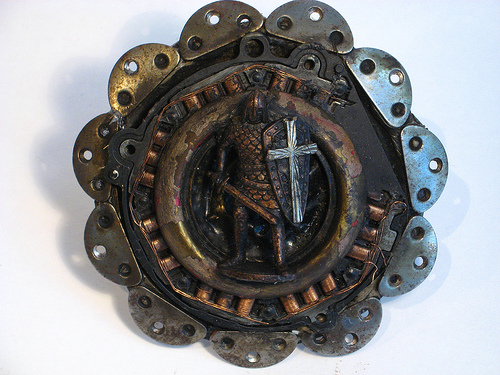We run our website the way we wished the whole internet worked: we provide high quality original content with no ads. We are funded solely by your direct support. Please consider supporting this project.
Absolute Truth and Violence
A common argument today against Christianity is that believing that Jesus (or any other religious figure or religion) is the only way to God (See yesterday’s post) is “dangerous.” This claim actually has some justification, for it is undeniable that most of the butchery carried out throughout history has been done in the name of defending a god, a religion, a nation or an idea as an unquestionable absolute ideal. Religious absolutism has killed millions, no doubt. The admirable desire to bring an end to this insanity has led many academics to claim that, for the sake of the future of humanity, we must categorically reject all absolutistic claims, especially on religious matters.
I empathize deeply with this sentiment. At the same time, the reasoning behind it is flawed, on at least two accounts.
First, this kind of reasoning confuses the truth or falsity of a belief with its positive or negative consequences. Because a belief has tended to have certain negative consequences does not in and of itself tell us whether the belief is true or false. This point is especially relevant in light of the fact that people often act in ways that are inconsistent with the truths they proclaim, and nowhere is this more clearly the case than with Christianity.
This leads directly to a second point. I maintain that the Gospel message is the one and only absolute truth claim that could never result in bloodshed, if it was actually followed. If Christians followed Jesus’ teaching that his followers are to love and serve their enemies rather than kill them, no one in the whole of history would have ever been killed in Jesus’ name.
Every other religious or political or philosophical ideal one could ever hold as an absolute can (and probably will at some point) result in violence toward others. Sooner or later a person or tribe may deem it justifiable to kill others in order to advance, or defend, their absolute ideal. But the ideal of self-sacrificial love can never result in violence, for this absolute stipulates that its defenders must be willing to die rather than kill for the sake of the absolute.
If one’s religion is their highest ideal, then at some point killing people to defend or advance their religion will seem justified.
If one’s nation is the highest ideal, then at some point killing people to defend or advance their nation will feel justified.
If democracy is one’s highest ideal, then at some point killing people to defend or advance democracy will be justified.
If the American way of life is one’s highest ideal, then at some point killing people to defend or advance the American way of life will feel justified.
Even if one’s own definition of truth and justice is held as the highest ideal, then at some point killing people to defend and advance this version of truth and justice will feel justified.
The only ideal that cannot result in violence is the ideal of self-sacrificial love. And since Jesus incarnated this ideal and told us to follow his example, I would argue that, far from being dangerous, holding to the absolute truth of Jesus is the only truly safe candidate for an absolute truth on the table.
The problem with those Christians throughout history who have supposedly “defended Jesus” with the sword is not that they believed Jesus was the only way. The problem is that they didn’t believe it enough.
Category: General
Tags: Enemy Love, Holy War, Love, Self-Sacrificial Love, Service, Truth, Violence
Topics: Ethical, Cultural and Political Issues
Related Reading

A Cruciform Dialectic
One of the most important aspects of God’s action on Calvary, I believe, is this: God revealed himself not just by acting toward humans, but by allowing himself to be acted on by humans as well as the fallen Powers. God certainly took the initiative in devising the plan of salvation that included the Son…

The Image of Cross-Like Love: God’s Self-Portrait, Part 6
In the previous blog I argued that God is cross-like love. In this blog I’d like to take this a step further by demonstrating why the cross alone could function as the definitive revelation of God’s true character and by showing how this revelation weaves together everything Jesus was about. If you want to know…

Why God Made You
The life God has for each one of us is a life of perfect love, one that eternally unites us with the Father, Son and Holy Spirit. This is why God made us. It’s what we long for, to love and be loved. However, things like the love of the Trinity are not part of…

Did the Crucifixion Allow God to Atone for His OWN Sins? (podcast)
Greg considers God’s nature and if he could sin. Dan confesses an old gambling habit. Episode 477 http://traffic.libsyn.com/askgregboyd/Episode_0477.mp3

Sermon Clip: Tough To Love
Learning how to love the people in our life that we find challenging to deal with is often very difficult. This week in Heart Smart Greg Boyd looks at some biblical examples and instructions on how to love our enemies in the same way we love our friends. Full Sermon Here: http://whchurch.org/sermons-media/sermon/tough-to-love


